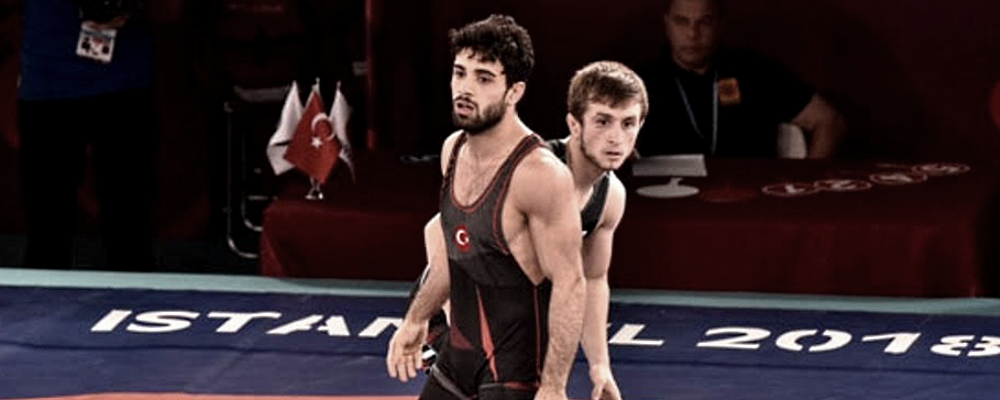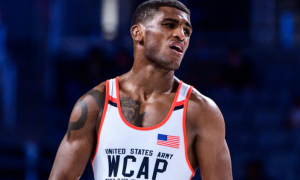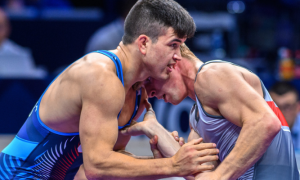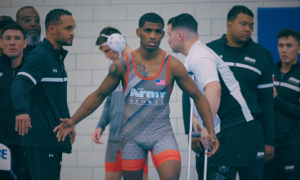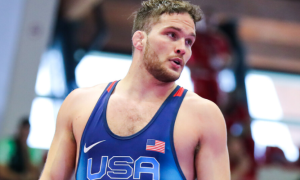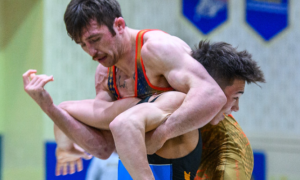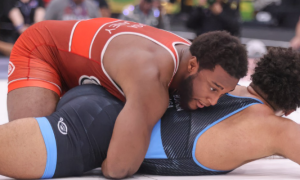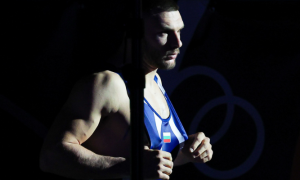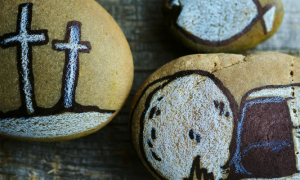The two lightest weight classes at the 2018 Greco-Roman World Championships could (and should) be the two most exciting. It is not because, or not just because, of lightweight bias, a line of thinking that suggests smaller athletes equal more technical skill and more actionable sequences.
What you’re seeing with Senior international Greco-Roman wrestling is that the next generation is producing an influx of creative attacks. Even well-schooled athletes from powerhouse nations (often referred to on 5PM as “classically trained”) are demonstrating technical variances and resourceful counters which could almost be construed as antithetical to their perceived traditional reliance upon par terre offense. These little ninjas don’t like waiting around as much to make something happen. So long as they are left unencumbered, many of the planet’s best are more than willing to decide the outcome of a match for themselves.
It bears mentioning that this edition of the Senior Greco Worlds abides by United World Wrestling’s “Ranking Series”, a new system which sees accumulated point values earned in a collection of international events assigned to qualifying athletes in effort to determine their ranking. For a detailed synopsis, please visit here.
What is necessary to know when perusing this material is that athletes ranked in the top-4 are/were intended to be seeded in that order. However, if an athlete who enjoys a top-4 ranking/seed does not participate at the World Championships, that seed is gone and the others in the top-4 move up — but it ends there. For example, a #5 athlete does not jump to #4 and so on down the line. Everyone below the acknowledged seeds are subject to the randomized draw.
At the end of the day this is all minutiae. It’s the World Championships. High seeds do not in any way, shape, or form represent safety or an easier road to the later rounds. As such, you’re only being asked to observe some of the names who may contend and then enjoy the show once it begins.
2018 Greco-Roman World Championships
Budapest, Hungary
55 kg
Thursday, October 25th — Qualification rounds through semifinals.
Friday, October 26th — Repechage rounds through medal matches.
60 kg
Friday, October 26th — Qualification rounds through semifinals.
Saturday, October 27th — Repechage rounds through medal matches.
The World Championships will be available to watch in the United States on Trackwrestling.com.
55 kg
Top Seeds
1. Ekrem Ozturk (TUR)
2. Shota Tanokura (JPN)
3. Abdelkarim Fergat (ALG)
Although a statement declaring that Ozturk is one of the only “true” #1’s is subjective, it is also difficult to dispute when you consider just how effective he has been this season. He catapulted to gold at the Takhti Cup despite operating in hostile territory and overcoming a few dodgy calls. Then it was third at the Senior Euros, silver at the U23 Euros, and tournament wins at his home country’s Vehbi Emre — and finally at the University Worlds. Because Ozturk collected medals at Takhti, the Euros, and Vehbi Emre, he accrued a whole lot of points, hence why he is ranked first.
Tanokura received the opportunities he did this year due to 55’s reintroduction, and that is the only reason. Japan was loaded at 59, certainly still is at 60, and there simply just aren’t enough big international tournaments to go around. But the experienced warrior made every dance count. 28-year-old Tanokura really impressed en-route to victory at the Asian Championships and then made the finals in each subsequent event.
As Ozturk stands as a legit #1, Fergat is not a legit #3, which is to say, most observers do not peg the Algerian as the actual third best athlete in this weight class. That is not intended as a slight to Fergat, who benefited in the points race thanks to his storming through the lightly-attended African Championships. However, his most telling performance — and why he is worthy of watching out for — came at the Hungarian Grand Prix where he put in a sparkling effort to seize bronze.
Tarp Talk
Ozturk has the frame, the positioning, and a disciplined arsenal of reliable go-to attacks to suggest he could make a deep run. He is especially adept at snaring go-behinds, which he likes to do by coming across on short drags before using his long arms to wrap around opponents’ waists. But he involves his legs aggressively, too, and will lower his level on angles to torque foes to the mat for takedowns. A static lifter but a transitional gutter: like every elite athlete, Ozturk immediately looks to gut following a takedown, but from par terre he is not afraid to pop for a side lift or collapse downward if his lock isn’t adequately cinched. Add in the confidence of what has been a standout campaign, and it’s easy to point this guy out as a severe medal favorite.
Kazakhstan had one of two options at its disposal for 55 kilos — either the innovative assaulter Horlan Zakhansha (world no. 2) or former Junior World silver Zhanserik Sarsenbayev (world no. 7). They are going with 27-year-old Sarsenbayev, who is not a bad choice but a questionable one given Zakhansha’s physicality at this weight — along with the familiarity he acquired here throughout the season. Sarsenbayev is also a lot more conventional than Zakhansha. He’s more linear, but with some quickness.
Tanokura is one foreign Greco-Roman athlete US fans can relate to, as he pokes and prods almost akin to a folkstyler. He can grind, he can high-dive, and switches between a relentless pace and patient stalking. But can he survive an early round scare or grit out a few wins on the first day to put himself in position? Maybe. It kind of depends where Vasily Topoev (RUS, world no. 18), Zholaman Sharshenbekov (KGZ, world no. 9), and Moslem Naderi Khadem (IRI) wind up in the bracket. Topoev, 29, is another wrestler from a stacked nation who was able to see significant mat time this season due to the new weight class, and he’s as clean and artful as it gets. Neither he, Sharshenbekov, or Khadem should be dismissed as potential medalists or overall champions.
Team USA — Sam Hazewinkel (Sunkist) “Haze”, at 35, isn’t even the oldest guy in this bracket. That distinction belongs to Naderi Khadem (36). No matter, age won’t likely be a factor for anyone on game day, and certainly not for Hazewinkel, whose shrewdness and competitive spirit are why he made the US Team in the first place. He should also be fresh. Unlike most of the American squad, Hazewinkel only did bits and pieces of the overall workload — in part because he is a collegiate head coach with a bevy of responsibilities, and also because he wanted to be cautious when it came to recovery.
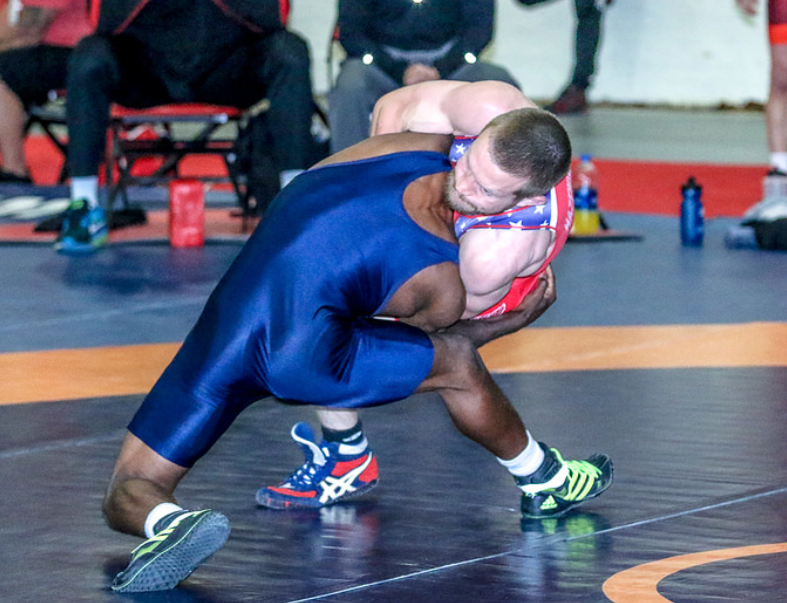
Hazewinkel (red) returned from a multi-year hiatus at the 2018 US Open, ultimately finishing second to Max Nowry (Army/WCAP). Just shy of two months later, Hazewinkel was back at it, tearing through the challenge tournament at the World Team Trials before downing Nowry in two straight bouts to clinch his first-ever Senior Greco World Team spot. (Photo: John Sachs)
Although he’s “The Legacy”, the overwhelming majority of the athletes here have little clue as to who Hazewinkel is, or what he’s capable of. If even at all. Obviously, that could be an advantage. Hazewinkel, provided he demands the fight take place from his positions, will have his vast array of arm spin variations and off-the-cuff scrambles few will have answers for. Close matches at the World level dictate that this becomes a “turn and not get turned” sport — a traditional weakness for the US. Hazewinkle knows that better than anyone. Producing a high tempo at 55 comes with the territory, so any type of discernible reluctance tends to be more noticable (and therefore punishable) than it is for the other weight classes. A wrestler like Hazewinkel needs to make it clear to his opponents and the officials that he is constantly working so as to avoid phantom calls that make everyone scratch their heads.
Skeptics will say, and have said, that Hazewinkel is just here for a victory lap, one last ride, one final curtain call and on a Senior Greco World Team, to boot. Holy crazy. A married father of two kids who is also a college coach doesn’t upend his lifestyle to cash stipends or for cursory photo ops in a Team USA warm-up. Hazewinkel has put in an awful lot of work behind the scenes because he believes he can defeat World-caliber competition at the World Championships. Chalk it up to “man strength”, his lineage, or the fact he’s not all that concerned with what you think, anyway. Sam Hazewinkel is going to stand across from his opponents convinced he can wreck their tournament. Bow in respect.
60 kg
Top Seeds
1. Luis Orta Sanchez (CUB)
2. Aidos Sultangali (KAZ)
3. Sergey Emelin (RUS)
60 kilograms, the lightest of the Olympic weight classes, is without its #1 seed since Kyrgyzstan is apparently not sending Kanybek Zholchubekov. That makes Cuba’s Luis Orta Sanchez (world no. 2) the highest seed. Orta Sanchez is a fine wrestler and it is not outside the realm of possibility that he finds a way to contend at this thing. But given that he has not enjoyed a ton of competitive opportunities, you’d like to see him go toe-to-toe with a higher grade of opposition before getting too pumped up about his chances.
2017 U23 World bronze medalist Sultangali, who defeated Dalton Roberts (NYAC/OTS) last year in Poland, takes the third spot in this bracket. Whether or not that is a suitable placement for him is really besides the point. Sultangali should be in the mix. A criteria loss to Iran’s Sherzad Ali Beheshtitala in the Asian Championship quarters ended his day right then and there. If Sultangali had managed to medal in Bishkek, he’d be the one sitting at #1. Alas, peace out to all hypotheticals.
2017 U23 World runner-up Emelin (RUS) checks in at #3, and he’s a guy who deserves to be placed where he is. The Senior European Championships was the only “Ranking Series” event for Emelin this season. He won it, but even without that gold there is no doubt about the Russian’s ability or general prowess. Emelin was identified as a youth as a potential Olympic champ and has been groomed appropriately. He isn’t invincible — Emelin doesn’t love being pushed and can get overwhelmed by speedsters. But because he is lockdown from par terre (in both phases) and has gained a lot of marquee experience the past three seasons, his status as a medal candidate is richly deserving.
Tarp Talk
Emelin…Sultangali…Mehrdad Mardani (IRI)…former World champ Ivo Angelov (BUL)… They should all be players in Budapest to some degree. Even if they are, the lights may burn brightest for 2016 Olympic silver Shinobu Ota (JPN, world no. 7). Glance at Ota’s career post-Rio: loses his National spot to Kenichiro Fumita; still competes and wreaks havoc through the summer with a few statement-making wins, including one over Emelin at Pytlasinski; watches Fumita win the ’17 Worlds; and then resumes command of his weight class and goes on a crazy tear this season, dropping one match to then-buzzsaw/hometown hero Nikolai Vichev (BUL) up a weight class at Petrov but winning everywhere else.
Ota isn’t special because he’s accomplished, he’s special because he is creative and explosive. Few smallish athletes can vary between hardcore in-the-trenches pummeling and lightning-quick fast-twitch body attacks — sometimes from weird angles. No one is ever really that comfortable wrestling Ota — and he gets that — which gives him all sorts of advantages when it comes to setting up his offense. If he has to operate patiently to one side in order to open up the other, so be it. And if he scores on something big, look out, because he will follow-up aggressively to end the match right then and there.
Mardani might be equally dangerous, and the brilliant Kim Seung-Hak (PRK) is more than capable of putting in another podium appearance. Now-two-time Junior World champ Kerem Kamal (TUR) and 2016 Junior World champ Dato Chkhartishvili (GEO, world no. 8) should both be gunning around holding high hopes, as well. Kim, a bronze medalist last year, is more the complete package in terms of Senior callousing and par terre offense, so it’s difficult to picture this all unfolding without him in the argument. Out of Chkhartishvili and Kamal, Chkhartishvili is better suited for the positional grind a lot of the opposition has to offer. Few will be thinking about former Junior World silver Victor Ciobanu (MDA), but he’s another athlete you’ll want to watch just because he likes to fly open quite a bit and attempt wild throws.
Team USA — Dalton Roberts (NYAC/OTS) It has taken Roberts a mere summer’s worth of World Team camps to make everyone on the outside of the USA Greco bubble a believer in who he is, and what he can do. No one in the country works harder, a fact that has now been witnessed by enough people to count it as verifiable. They see the practices — the incomparable work rate, the eager attitude, and the seriousness in which Roberts embraces each and every task. What do you see? The product. The result. You might also see a medal dangling around his neck.
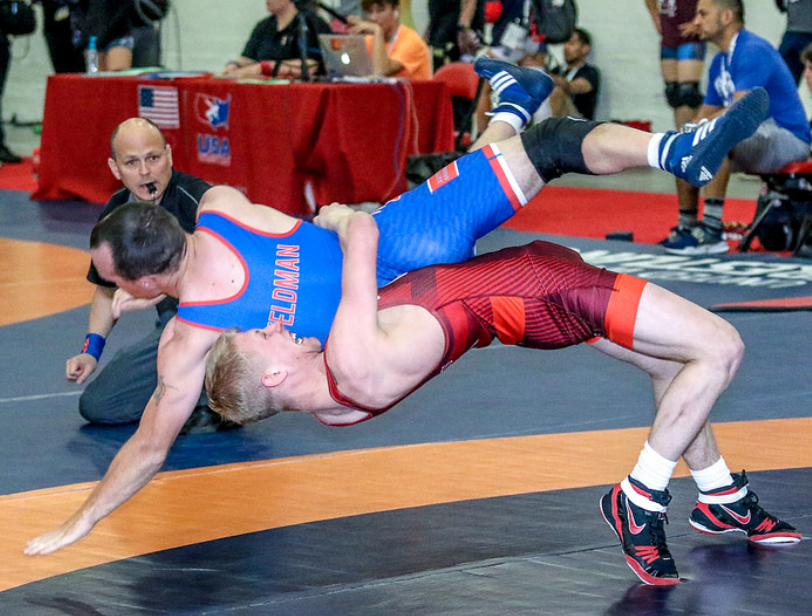
2018 saw Dalton Roberts (red) win his first Senior National title. Despite having earned a place in the World Team Trials best-of-three finals, the Michigan native was seen as an underdog against 2008 Olympian Ildar Hafizov (Army/WCAP). After dropping the first bout of the series, Roberts won the next two. He later added a silver from the Grand Prix of Germany in August that served as a further sign he should be taken seriously in Budapest. (Photo: John Sachs)
If you’d like to think of Roberts as a medalist, you have to first understand why he could be one. It isn’t because of his technique; every athlete mentioned above is more polished and wiser to the ways of the international scene, this despite Roberts’ previous age-group World appearances. They are all, for the most, part, classically trained and more adept in the finer points of Greco than either Roberts or the vast majority of Americans.
But not one of them — not Ota, not Emelin, not Mardani or Chkhartishvili — will be able to keep up with Roberts if he is in the hunt late in a match. That’s because Roberts will have already begun the breaking process in the first period. The key will be reaching that crucial stage of a bout. Roberts showed in the German Grand Prix semis against Maksim Katharski (BLR, world no. 12) that he could pull out a win late over a seasoned foreigner trying to skate. It was the work beforehand that helped in the result. He just keeps coming, it never stops. He fights for every blessed inch, and not every guy, not even some of the dudes above, have that kind of sauce in them. Chances are we’ll see that quickly, for it is highly likely Roberts draws one of the known names early on. That’s exactly what Roberts wants, and you should, too.
SUBSCRIBE TO THE FIVE POINT MOVE PODCAST
iTunes | Stitcher | Spreaker | Google Play Music | RSS

Notice: Trying to get property 'term_id' of non-object in /home/fivepointwp/webapps/fivepointwp/wp-content/themes/flex-mag/functions.php on line 999

